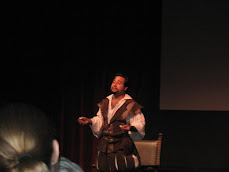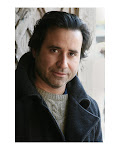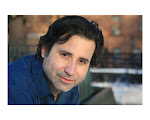puts on Schennkan's
By the Waters of Babylon
INFO
By the Waters of Babylon
2.5 starsAmerican Stage, 211 Third St. S., St. Petersburg, 727-823-PLAY. Runs through Oct. 12. 7:30 p.m. Wed. and Thurs., 8 p.m. Fri. and Sat., and 3 p.m. Sat. and Sun. $24-$39, student rush $10.
Let's call it the "Conjunction of Opposites" type of play: Two people who couldn't seem more different are thrown together by fate or law or need or accident, and come, after some difficulties, to respect and love one another. These plays come in the form of Visiting Mr. Green, Six Dance Lessons in Six Weeks, Educating Rita or, these days at American Stage, By the Waters of Babylon. The subtext of the play is idyllic and politically correct: Deep down we're all the same, plus we're wonderfully understanding, and anyway we need each other's help in order to heal our secret wounds. Who wouldn't be uplifted by such a play and such a message? So what if it's formulaic and even manipulative? Who'd be so churlish as to say that he or she wasn't uplifted -- or even moved?
Me. Liberal, soft-hearted, I-wish-things-were-this-simple me.
It's not that author Robert Schennkan doesn't know where our sympathies lie and how to jerk them around. Schennkan is an accomplished wordsmith whose dramaturgy is nearly flawless and who gives two talented actors -- in this case Julie Rowe and Chaz Mena -- the opportunity to play everything from gentle lyricism to violent madness in the course of two perfectly calibrated acts. But the whole problem of the play is that it's utterly transparent: We know so exactly what we're supposed to feel from moment to moment that it becomes impossible to feel it.
I'm glad to know that there are writers like Schennkan -- with the right values, with deep respect for women and immigrants. But it takes more than moral clarity to make a play work. If life were as manageable as this drama ultimately suggests, most of human history would never have happened.
By the Waters of Babylon is about Catherine, a widow, and Arturo, the Cuban man whom she employs one day as her gardener. Catherine, we learn, is being "shunned" by her neighbors as a "harpie" and "slut," for reasons that will ultimately become clear. Her late husband Edgar, she says early on, was a tight-fisted academic, possibly an alcoholic, and he died of a heart attack -- though she "jokes" at one point that she murdered him herself. Catherine's great regret is that she never had a child, that she miscarried the one time she was pregnant. As to her connection to Cuba, the only one she can think of is that her parents honeymooned there before Castro took over. Catherine is lonely and neurotic and just ready for some kind of relationship with Arturo. In a play this formulaic, it's inevitable that they'll connect.
Arturo is a little more interesting than his employer. He's a poet who found Cuban censorship just too hard to take, and on an impulse set out with a few other men on a fishing boat for what should have been a short journey to Florida. But the boat ran out of gas, the brief transit turned into a long nightmare, and now he has such a severe case of survivor's guilt, he can't bring himself to write another word. After establishing his equality with his American boss, he teaches her to dance (I found this whole sequence a cliché), how to make a mojito (lots of rum), and just maybe how to transcend certain terrible memories.
Most of all, though, Arturo is a stereotype: the romantic Latin with poetry in his soul, unafraid to cry openly, a born lover but temperamental. Arturo has a kind of grudging respect for "El Jefe" -- nobody in Cuba calls Castro by his name, he tells us -- and has a few fine moments utterly untouched by cliché, as when he defines Cuban music as the merging of the spirit of two groups of exiles, Spaniards and slaves (and his explanation of Che Guevara's continuing popularity in Cuba is brilliant and persuasive).
If you don't know what's coming for Catherine and Arturo, you haven't been watching much television or reading supermarket novels. The only really suspenseful question is: What'll happen to them afterward? Can a well-off Anglo woman find happiness with a Cuban day laborer? And can this laborer give her 20 years of psychotherapy in 10 minutes?
The acting is luminous even as the narrative fails, again and again, to rise above triteness. Mena as Arturo is a dream of good intentions and emotional availability, while the ever-dependable Rowe offers us an initially likable image of dotty loneliness, social insecurity and, ultimately, dangerous anger. Director Drew Fracher's skillful staging contains some moderately explicit moments (sexually and confessionally), and Jeffrey W. Dean's two sets give us a credible exterior and interior of Catherine's house. The last half or so of Act 2 is genuinely surprising -- which means things finally get interesting -- but no sooner has author Schennkan given Catherine a really serious, apparently intractable problem than he purports to solve it with some imaginative hocus-pocus. Not wanting to give anything away, I'll just say that if this solution works, then so should Sarah Palin's vast experience in geopolitics.
I didn't buy it. I don't think you will either. I think you'll walk away from the theater wondering, as I did, whether anybody actually went where this utterly manipulative drama tried to take them.
At least its heart is in the right place. That has some virtue. All that's missing is the mystery, the ambiguity and the messiness of artistic honesty.





















No comments:
Post a Comment